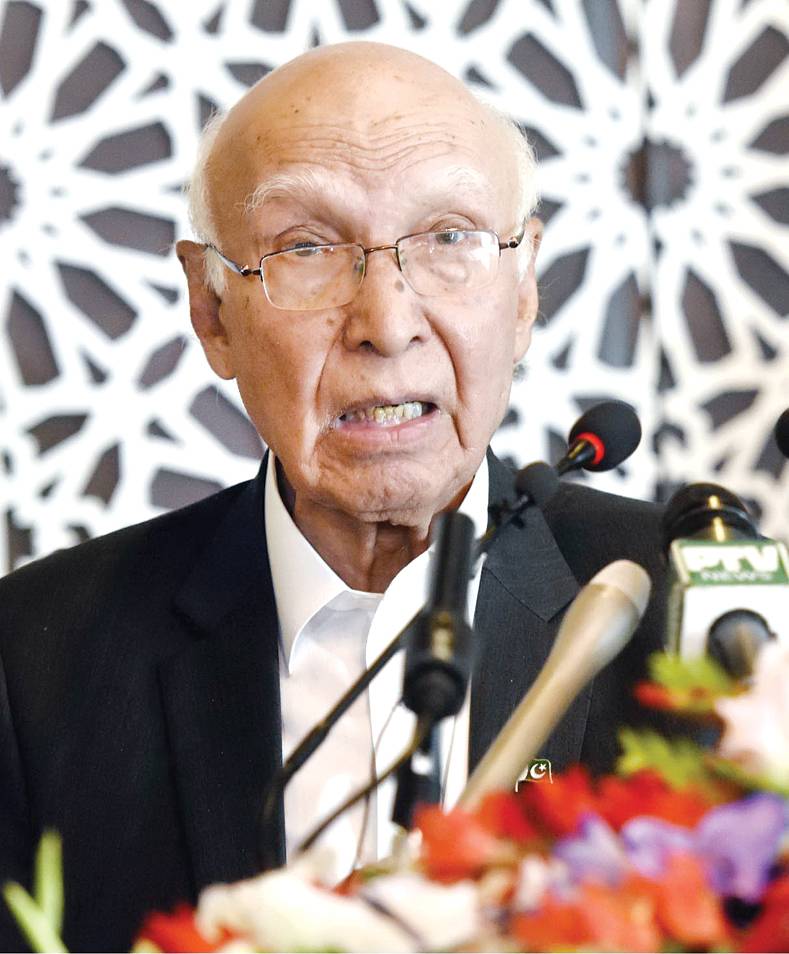ISLAMABAD - The foreign ministry is expected to again have a pair running it as a federal minister and an adviser – both equal in rank and responsible to the prime minister, The Nation learnt.
While Khawja Asif has officially taken over as the foreign minister, Sartaj Aziz is set to return as the adviser to PM on foreign affairs – a post he held until Nawaz Sharif was disqualified as the premier last month.
Official sources said that Asif will mostly look into the administrative affairs while Sartaj Aziz will be dealing with the diplomatic business.
Previously too, the foreign ministry was run by two people – Aziz and Tariq Fatemi. For around four years, Sartaj served as senior to Fatemi as he held the status of a federal minister against Fatemi’s position whose post as special assistant was equivalent to a minister of state.
For four years until his disqualification last month, Nawaz Sharif had been under pressure to appoint a full-time foreign minister in place of Sartaj Aziz and Tariq Fatemi to deal with the diplomatic challenges. Fatemi was sacked for his role in Dawn Leaks in April.
The opposition pressure grew recently as Pakistan went through a bad phase of ties with neighbours – India, Afghanistan and Iran. The relations with the US were also shabby. But Sharif kept the foreign minister’s portfolio with himself.
Weeks before his disqualification, Sharif visited the foreign ministry for a meeting with the top diplomats and aides to discuss the regional tension and India’s growing relations with the US.
Since the start of the year, the Pakistan government and top diplomats have been on the mission to win over US President Donald Trump’s trust and muster support against Indian aggression besides improving ties with the regional countries. So far however, India looks heads and shoulders ahead in Washington. The neighbourhood situation is also not promising. But Pakistan has improved ties with Russia and retained China as its chief supporter.
Close aides of PM Shahid Khaqan Abbasi, who replaced Sharif this week, told The Nation that he will name a few advisers and Sartaj Aziz was one of them. “Sartaj Aziz will resume his duties soon and both Khawja Asif and Sartaj Aziz will work together,” said a cabinet member who only took oath yesterday.
Officials at the foreign ministry also indicated that they were waiting for their old boss – Sartaj Aziz – to return to work. “Previously too we have two bosses. Once again we are expecting the same,” said one official.
Khawja Asif started his job by holding a meeting with Acting Assistant Secretary of State for South and Central Asian Affairs and Acting Special Representative for Afghanistan and Pakistan Ambassador
Alice Wells who visited Islamabad August 3 and 4 as part of her introductory trip to the region.
Later, Asif said the government was committed to improve the country’s standing as the ‘visionary leadership of Nawaz Sharif’ had put the country on fast track of progress.
The new foreign minister is considered a hawk in the Pakistan Muslim League (Nawaz) who as defence minister was vocal against India. His selection as the top diplomat was also a message to India amid the rising tension.
Sharif’s close aides said that the former premier will still be the ‘de facto foreign minister’ after Asif’s appointment. “Nawaz Sharif really wanted to keep the foreign ministry’s portfolio with himself until he was the PM. Since he is gone now, he has approved his confidante for the job. Khawja Asif is more politically active than Sartaj Aziz and will keep Nawaz Sharif updated on all affairs. Sartaj Aziz will perform the official diplomatic assignments as he had been doing,” said an insider.
He said Sharif will be satisfied that all three people running the foreign ministry – Khawja Asif, Sartaj Aziz and Foreign Secretary Tehmina Janjua – were close to him.
Janjua was picked by Sharif to lead the foreign ministry this year among a few potential candidates. Pakistan High Commissioner to India Abdul Basit – a strong candidate for the job - has already sought early retirement to show his resentment on Janjua’s elevation.
Speaking about the government’s policy yesterday, Prime Minister Khaqan Abbasi reiterated Pakistan’s resolve to extend moral, political and diplomatic support to the people of Kashmir for their right of self-determination.
In a meeting with Foreign Secretary Tehmina Janjua here, the PM directed continued projection of “grave human rights violations in Kashmir by the Indian forces.” The foreign secretary briefed the prime minister on Pakistan’s foreign relations. The briefing covered in detail, issues of importance in Pakistan’s foreign policy.






